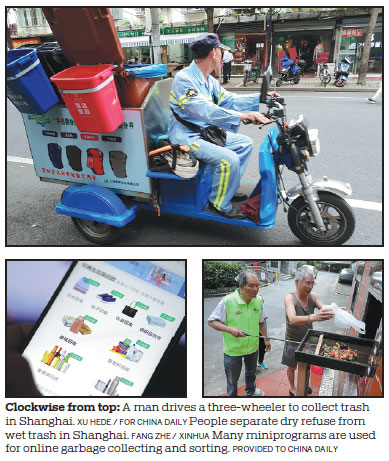Collectors treasure trash for cash
A few years ago, collecting garbage was a bleak business for everyone involved. However, since trash sorting became an important practice in many parts of China, it is a promising sector.
Li Wanhai is a garbage collector for AiFenLei, a WeChat miniprogram engaged in online garbage collecting, sorting and recycling services.
Every day, the 57-year-old and three colleagues can receive around 40 online orders and collect 600 kilograms to 1 metric ton of waste from five large residential communities in Beijing's Changping district.
"The job is flexible and meaningful," said Li, who earns around 7,000 yuan ($1,000) per month.
AiFenLei employs 60 collectors, 60 supervisors, 30 sorters and 30 publicity officers, but when Li joined the company a year ago, after quitting his job as a driver for a ride-hailing company, there were just four collectors.
The ubiquity of smartphones provides great potential for incorporating waste sorting in the online world, and AiFenLei is one of a growing number of companies that have turned to online garbage disposal solutions.
"We are hiring more people involved in the industry to meet the growing demand," said Xu Yuanhong, the company's general manager.
Recently, China has been pushing hard to cultivate the garbage-sorting habit. According to the government, trash-sorting systems will be built in 46 major cities by the end of next year, and all cities at prefecture level and above should have built such systems by 2025.
Moreover, stricter garbage-sorting rules have yielded more job opportunities, and turned trash into cash.
Qiao Junsuo, a garbage truck driver in Beijing's Chaoyang district, is happy with his decision to quit his previous job - he was a taxi driver for 10 years - and is content with his monthly salary of 4,300 yuan, along with social insurance payments and a housing allowance.
"I'm glad to see that more and more people are aware of the importance of waste sorting, and I hope the authorities pay more attention to recycling. The booming industry means that I can earn more to raise my three kids," the 40-year-old said.
Qiao - one of about 80 garbage truck drivers in Chaoyang - usually drives to an incinerator in the suburbs once or twice a day, carrying 15 tons of waste each time.
Beijing generates nearly 26,000 tons of household garbage every day, about 1.1 kg per person, and the amount is rising, Sun Xinjun, head of the Beijing Municipal Commission of Urban Management, told a TV show recently.
"If garbage collection is not timely, there will be a huge impact on residents' daily lives," Sun said.
Shanghai's residents produced more than 9 million tons of household garbage last year, putting huge pressure on the environment and the city's sustainable development.
Many residents turn to online waste collectors for help. According to State broadcaster China Central Television, a waste collector in Shanghai can earn more than 10,000 yuan a month, depending on how much trash they collect.
In 2000, China began piloting garbage sorting in eight cities, including Beijing and Shanghai, plus Guangzhou and Shenzhen, both in Guangdong province, by installing waste bins on the streets. However, there is a still long way to go, even after nearly two decades.
According to a survey conducted by the Policy Research Center for Environment and Economy at the Ministry of Ecology and Environment, more than 92 percent of the over 13,000 interviewees recognized the importance of garbage sorting for environmental protection, but only 30 percent thought they were doing "very well" or "relatively well" in disposing of household waste correctly.
Wu Shunze, director of the research center, said the government should take concrete measures and produce policies to promote garbage sorting, while the rising volume of garbage means trash-sorting businesses need more professionals, and it could take generations to form good habits.
Liu Jianguo, an environment professor at Tsinghua University, said garbage sorting is a long-term process, and step-by-step efforts will be required to tackle the problem.
Cheng Lu, He Xiyue and Qin Jing contributed to the story.
Xinhua

(China Daily Global 07/08/2019 page5)


















